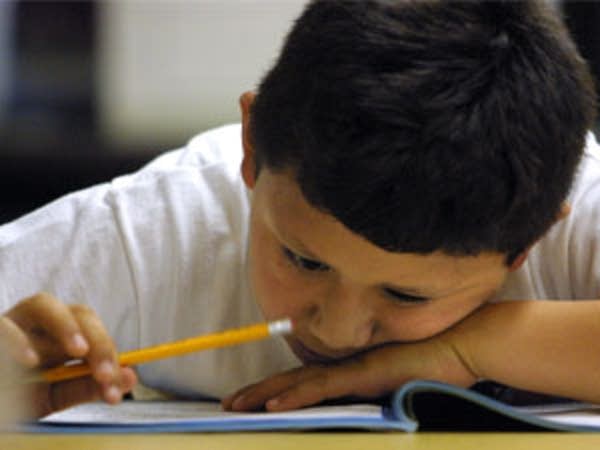Minnesota students' math and reading proficiency declines
Go Deeper.
Create an account or log in to save stories.
Like this?
Thanks for liking this story! We have added it to a list of your favorite stories.

Nearly half a million Minnesota students in grades three through eight and high school took the new Minnesota Comprehensive Assessments, or MCA-II (pronounced MCA-twos), last spring. The newly designed reading and math tests were developed in response to more rigorous academic standards.
Third graders performed the best in reading and math tests. About 80 percent of Minnesota third graders tested as proficient, but the numbers gradually declined in the higher grades. About two-thirds of 10th graders are proficient in reading, while less than a third of 11th graders are proficient in math. State education commissioner Alice Seagren says there's no need for alarm.
"This is reflecting that we've set higher standards, and this is our baseline, so now we know that we're going to go, we're going to continue to expand that percentage higher and higher, because our kids are going to be educated at higher levels of rigor," she says.
Seagren says 11th graders who took the math test left, on average, about a third of the answers blank. That tells her that either the test was too hard for them, or some students didn't take it seriously. Seagren says the test results can't be compared with previous scores, since the test is brand new.
Turn Up Your Support
MPR News helps you turn down the noise and build shared understanding. Turn up your support for this public resource and keep trusted journalism accessible to all.
But the test scores ARE a major factor in whether schools meet their performance goals through No Child Left Behind. Education officials say 483 Minnesota schools didn't make what's called "adequate yearly progress" by the No Child Left Behind law, including half the schools in Minneapolis. Two Minneapolis schools have been on that list for four years now, and must prepare for restructuring.
The chief academic officer in Minneapolis, Bernadeia Johnson, says the district is working with the two schools to help them improve. She says the district will put more emphasis on math, and work with under-performing schools.
"We know that we have a lot of work to do, and we're up to the challenge. And like I said, it just means being more strategic with strategies that we put in place, and learning from those schools that are doing well," she says.
Commissioner Seagren says schools with higher percentages of English language learners, special education students and low-income students have more challenges meeting the requirements of No Child Left Behind.
"There's no excuse, we want to shine the light on those issues, and then look at strategically how we can change our curriculum, how can we more effectively educate those students, and I think that's what No Child Left Behind has done."
The test results will likely add to the ongoing debate over education funding at the Capitol. Rep. Mindy Greiling, DFL-Rosville and the lead Democrat on the House education finance committee, says funding for summer school, special ed and early childhood education was cut in 2003. Greiling believes those cuts had a direct impact on the results of the MCA-II's.
"What I think we have to focus on now is - what are we going to do about the achievement gap? We know it's there, we get better and better data, but what are we doing about it? Not enough, obviously, with these kind of results," she says.
Greiling also believes the test scores were deliberately delayed until after the election, as DFL gubernatorial candidate Mike Hatch charged during the campaign. Seagren denies that, and says the state asked for a federal waiver granting the delay long before education officials knew what the results were.
Seagren and other education leaders caution parents, students and teachers not to read too much into this year's results, because they are only a baseline. But the president of Education Minnesota, Judy Schaubach, says the results will be discouraging for schools and teachers.
"It is demoralizing, and it's very difficult for teachers that are working very hard, exceptionally hard, to help their students to meet these standards," she says.
Schaubach says students will need some time to prepare for the more rigorous standards.
The state also released the latest edition of school report cards, which give schools a rating of one to five stars based on test scores. Not surprising, given the new tougher test, only 78 Minnesota schools earned five stars in both reading and math. That's down from 123 the year before.




